Ballyclare, Co. Antrim
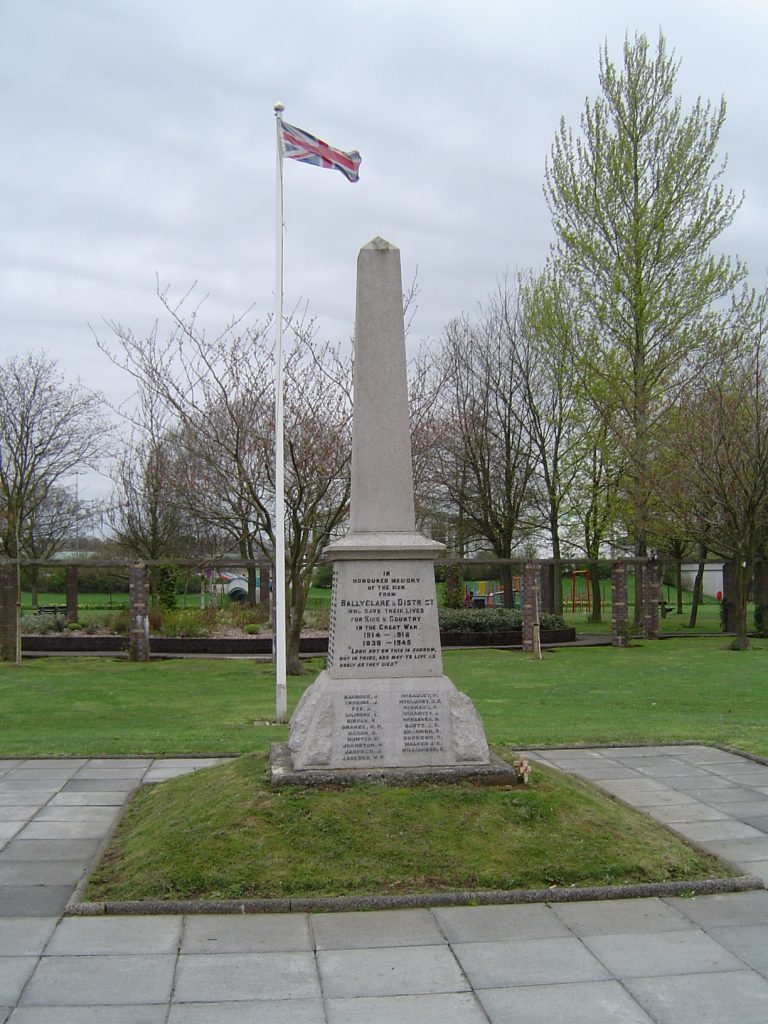
Ballyclare War Memorial Park and obelisk is located at Ballynure Road and Abercorn Drive. The park was formally dedicated on Sunday 9th November 1930, by His Grace the Duke of Abercorn, K.G., K.P., Governor of Northern Ireland and the gates formally opened by Mrs. J.J. Kirkpatrick,
The park consists of about five acres. Facing the entrance gates is a simple but dignified Cenotaph, upon which are inscribed the names of the 92 gallant men in whose memory it has been erected. There was also provision for a children’s play park in the plans.
The opening ceremony was performed by Mrs Kirkpatrick who was presented with a gold key as a souvenir. When the gates were opened Mrs Kirkpatrick was the first to past through, followed by the members of the Council and the War Memorial Committee. This was a rather belated memorial as it was opened in late 1930. The gates in the photograph are not the original ones.
The inscription is:-
IN HONOURED MEMORY OF THE MEN FROM BALLYCLARE & DISTRICT WHO GAVE THEIR LIVES FOR KING AND COUNTRY IN THE GREAT WAR 1914 – 1918
“Look not on this in sorrow, but in pride, and may ye live as nobly as they died.”
Adair, F.
Adair, A.
Armstrong, D.
Ayre, G.
Beattie, R.
Beggs, T
Bell, J.
Bell, J.
Bill, R.
Blair, J.
Busby, S. R.
Calwell, C
Carmichael, A.
Cassidy, W.
Clayton, W. B. A.
Coleman, J.
Corkin, P.
Davidson, James, Rifleman, Royal Irish Rifles
Douther, A.
Easton, S.
Elliott, William. Canadians.
Forsythe, J.
Furniss, J.
Gailey, A.
Gault, J.
Gault, R.
Hamill, M.
Harvey, J.
Hayes, R.
Henry, H.
Hill, A.
Hill, John, Rifleman, Royal Irish Rifles
Hill, J.
Hill, J. S.
Hill, S.
Holmes, W.
Jameson, A.
Jamison, J.
Johnston, A. I.
Kennedy, A.
Kirk, W.
Kirk, W. J.
Laird, L.
Laird, J. R.
Mahood, D.
Manson, R.
Martin, J.
Mayne, W.
Milliken, S.
Milne, G.
Montgomery, M.
Moore, Robert, Private, Highland Light Infantry.
McAuley, R.
McCalmont, D.
McCauley, R.
McClellan, Alan John, Lieutenant, Royal Irish Rifles
McClelland, W.
McClintock, James Thompson, Canadians.
McClea, B.
McGookin, T.
McGuigan,M.
McGuigan, S.
McKenzie, D.
McKinney, G.
McNeilly, T.
Neeson, J.
Nevin, J.
Percy, J.
Porter, A.
Reid, W. J.
Robinson, S.
Sempey, A. T.
Simms, S.
Symth, W.
Surgeoner, J. A.
Surgeoner, J. B.
O’Neill, W. W.
Taylor, T.
Taylor, J. P.
Todd, G.
Todd, R.
Todd, T.
Turkington, R.
Waddell, G.
Walker, E Mc. K.
Walsh, W. H.
Whelan, S.
White, R.
White, T.
Wilson, R. H.
Wright, W. J.

BALLYCLARE MEMORIAL
GOVERNOR'S VISIT
PARK OPENED: CENOTAPH UNVEILED
With all solemnity and honour Ballyclare’s memorial to the men of the town and district who had laid down their lives in the Great War in their service of King and country was formally dedicated to public remembrance on Sunday afternoon last by His Grace the Duke of Abercorn, K.G., K.P., Governor of Northern Ireland. The proceedings were attended by a very large and represented gathering of the inhabitants, reinforced by a number of Service units, who combined to make the occasion a fitting remembrance of the heroic dead. Navy, Army, Air Force, and ex-Service men were all well represented, and the ceremonial was conducted with the dignity and reference unsurpassable.
Though the Memorial may seem to be a rather belated one, there can be no doubt that the form it takes makes it most acceptable to the residents and in keeping with the enlightened public opinion of the times. The main part is a War Memorial Park of about five acres, which is in a most convenient situation off the Ballynure Road near the centre of the town, and lying between that road and the Sixmilewater. It has been very tastefully laid out, embellished with trees and flowering shrubs, and a proportion has been reserved for a children’s playground. Facing the entrance gates is a simple but dignified Cenotaph, upon which are inscribed the names of the 92 gallant men in whose memory it has been erected, and another striking feature of the pretty pleasure-ground is “The Moat,” that ancient landmark so familiar to all residents, which is in an excellent state of preservation. It is intended to install modern equipment in the children’s playground, and, as has been pointed out, the proximity of the park to the river makes the provision of a safe and commodious swimming pool a comparatively easy matter. The whole scheme is not alone a beautiful memorial to the dead, but a tribute also to the good taste and civic feelings of the committee in charge.
Prior to the arrival of His Grace the Governor, a very interesting ceremony took place at the main entrance to the Park on the Ballynure Road, where had been drawn up, in addition to a large attendance of the general public, the Chairman and members of the Ballyclare Urban Council; the 1st Ballyclare Company of the Girl Guides, under Captain Miss McCrothers and Lieut. Miss McConnell; 1st and 2nd Ballyclare Boy Scouts, under the command is Scoutmaster A. Fowweather, M.A., and Scoutmaster D. Lorimer; local ex-Service men under R.S.M., Samuel Gaskin; with whom was Sergeant R. Grange ; detachment of the Royal Ulster Rifles, with Lieut. R.B. Allman in command; detachment of Royal Inniskilling Fusiliers, under Lieut. Heard, M.C.; detachment of Royal Air Force from Aldergrove, under Flight Lieut. French and Pilot-Officer Grant; and detachment of R.N.V.R., Ulster Division, under C.P.O., D’Arcy.
Addressing Mrs. J.J. Kirkpatrick, who was accompanied by several members of her family, the Chairman of the Urban District Council (Mr Samuel McKnight) said it afforded him great pleasure to ask her to formally open the gates of the Ballyclare and District War Memorial Park. The residence were not unmindful of what her late husband had done for the betterment of Ballyclare, neither were they unmindful of the part she and her family had played in bringing that park into being. He was perfectly safe in saying that had it not been for the loyal support and monetary help of Mrs Kirkpatrick and her family, the residents of Ballyclare would not have had that park placed at their disposal.
Mrs Kirkpatrick was then presented with a gold key as a souvenir of the occasion by Mr S. Millar, the contractor for the fine entrance gates, the workmanship of which was admired by all. Mr Millar expressed the hope that Mrs Kirkpatrick would be spared for many happy years to be in their midst. In accepting the key and thanking Mr Millar for his gift, Mrs Kirkpatrick heartily congratulated him on the fine workmanship of the gates, which formed a fitting entrance to that beautiful park. She said she felt greatly honoured in being asked to perform the ceremony of opening that park, which had been dedicated to the memory of the men of Ballyclare and district who had laid down their lives in the service of King and Country. “Every time we pass through these gates,” she said, “may we be reminded of the cause for which they died, and may there be impressed upon us the duty of lifting on high the torch they handed to us, and so be ever ready to extend a helping hand to their comrades who are still with us. May we always remember that these men died that we might live; may we be worthy of their sacrifice.”
In conclusion, Mrs Kirkpatrick thanked the Chairman for his reference to her late husband, which she greatly appreciated. As Mr McKnight had said, her husband always had the welfare of Ballyclare and its people at heart. It was with great pleasure she declared that park open.
The gates were then opened, and Mrs Kirkpatrick was the first to past through, being followed by the members of the Council and the War Memorial Committee.
CONGRATULATORY ADDRESS.
The arrival of the Governor was heralded by the playing of the National Anthem, and after he had inspected the guards of honour he was received at the entrance gates by the Chairman, members and officials of the Urban Council. He was accompanied by the Duchess and attended by Lieut.-Commander Oscar Henderson (private secretary) and Captain Martelli, A.C.D.
Several presentations having been made, the Chairman (Mr McKnight) formally welcomed the Governor, and called on the Town Clerk, (Mr H.C. Scott) to read the official address of welcome, the terms of which were as follows :-May it please your Grace, -We, the Chairman, and members of the Urban District Council, representing the town of Ballyclare, most heartily and cordially welcome you and her Grace, the Duchess of Abercorn, on this your first visit to the town, and desire to embrace the opportunity of expressing our unalterable devotion to the person and Throne of his most gracious Majesty the King, and we rejoice with all his Majesty’s loyal subjects on his complete restoration to health.
We shared in the welcome offered you on the occasion of your first official entry into Belfast in 1923, but, needless to say, it affords us particular gratification to extend this welcome within the boundaries of our township.
We are very sensible of your Grace’s kind interest, and excoriations, in promoting the material welfare of the country, and we sincerely trust, that while you continued as Governor, you will take the same kindly interest, as you have hitherto done, in forwarding the material contentment and prosperity of the country.
May we remind your Grace that when the unparallel task-the Great War-confronted the Empire, that in no part of his Majesty’s dominions was there greater evidence of loyalty and self-sacrifice shown, and whilst Ballyclare has been somewhat dilatory in setting up a war memorial, we would humbly suggest to your Grace that that the form our belated war memorial has taken will be of lasting advantage to the inhabitants of our town.
We recognise the magnitude of the responsibility which your Grace has undertaken, and that it is the desire of your Grace to do all in your power to foster that spirit of goodwill and charity, which is characteristic of the people of Northern Ireland, and once again, we desire to express our good wishes for you personally, and for the success of your administration, feeling assured that under the Government of Northern Ireland, the comfort and happiness of the people will be promoted.
We trust that your Grace may be long spared to occupy the position of Governor of Northern Ireland in which position you have won a real and lasting place in all our affections.
Given under the Common Seal of the Urban District Council at Ballyclare the third day of November, 1930. SAMUEL MCKNIGHT, Chairman. NATHANIEL MCKINSTRY, Vice-Chairman. HERBERT C. SCOTT, Clerk of the Council.
The Governor graciously accepted the illustrated scroll containing the address, and, in reply, thanked the Council and townspeople for the warm welcome extended to him. He congratulated Ballyclare upon the public spirit displayed in the splendid response made by the men of the district to the call in the days of the war. That beautiful park would be a fitting memorial to all who had served and especially to those who had laid down their lives. His Grace was glad to be able to assure the people that his Majesty, to whom the address had made dutiful reference, was now completely restored to health and strength.
The Governor and party then proceeded to a cover platform which had been erected facing the Cenotaph, and took their places amidst a representative company who had accepted the invitation to the present. This included, in addition to the members of the Council and the War Memorial Committee, and those taking part in the ceremony:-Sir Thomas Dixon, Bart., H.M.I., and Lady Dixon, D.B.E., Sir Joseph McConnell, M.P., and Lady McConnell; Mr. J.F. Gordon, M.P., and Mrs Gordon; Captain Hugh Lecky, D.S.O., High Sheriff, and Mrs. Lecky; Mrs. J.J. Kirkpatrick.; Lieut.-Com. K.C. Kirkpatrick, D.S.C., and Mrs Kirkpatrick; Capt. and Mrs Drummond Kirkpatrick; Major Robert McCreary, M.C., and Mrs. McCreary; Major and Mrs Davies; Mr. Y.J. Kirkpatrick; Rev. W. Brann, L.L.B., and Mrs. Brann; Capt. and Mrs. R.S. Hanson; Rev. H.J. Osborne B.A., and Mrs Osborne; Rev. W.J. Guy Macbeth, B.A.; Rev. R. Harrison, B.A.; Rev. A. Bell, Capt. and Mrs. J. Ross, etc.
Prayer was offered by the Rev John Armstrong, M. A., Kilbride, after which the buglers of the Royal Ulster Rifles sounded the “Last Post,” followed a couple of minutes later by the “Reveille.” Then His Grace stepped down from the platform and unveiled the Cenotaph, prefacing his act with the words-‘To the glory of God, and in memory of the gallant men of Ballyclare and district who gave their lives for King and country, I now unveiled this Memorial. ‘Their name liveth for evermore.”
A CHALLENGE TO THOUGHT.
A short address was then delivered by the Rev John Redmond, B.A., C.F., Doagh, who took as his text the familiar words:- “Greater love hath no man than this, than a man lay down his life of his friends.” (St. John, xv, 13.) In the course of his remarks the reverend gentleman, referring to services such as that, said that all that is best in us demands these remembrance gathering. We would, indeed, be unworthy of the benefits our heroic dead won for us if we could result the impulse to commemorate their noble deeds.
He continued-“To talk about the benefits won for us by the war is, at this time, a challenge to thought. At present we are so absorbed in the question as to how we are to carry the burdens left to us by the war that to speak of any good that has come to us by it is indeed a challenge. But it ought to suffice to open a line of grateful thought if I asked you to compare our present burdens and the freedom we have with the greater burdens and slavery that would have been ours if the men whom we commemorate today, and others like them, had, by saving their lives, left us to the tender mercies of triumphant and rapacious enemies. And is there not ground for hope that by their sacrifices they ushered in a new era when the nations of the world will settle their differences not by war with its horrors, but by an international court of justice? When we think of the quality of the deeds and sacrifice of our heroic dead we remember them today not only with gratitude but also with reverence.”
After stressing the perils and discomforts experienced by the men in the fighting lines the speaker emphasised the ideals for which many of them fought, and pleaded that the furtherance of those ideals should in those days of peace engage the thought and energies of all in our social and industrial life. He asked, “Does not peace afford ample scope for heroic qualities, for all the noblest qualities that were called into existence by the war? Are there not victories to be won against great evils such as intemperance, the gambling dens of our cities and towns, the slum dwellings of our cities, against unemployment, against diseases such as cancer and tuberculosis, against maternal mortality, against the spiritual ignorance and apathy towards religion of thousands who are lapsed from the churches, and against all the other evils that infest the world today? How the face of human affairs would be changed in a few short years if men and women would hear the call of Christ as they heard the call of country in the Great War?”
A CALL TO SERVICE.
“But members of this audience may be saying in their hearts: -‘What definite call to noble self-sacrifice service comes to me?’ My reply is, looked about you, do you see nobody you can help in any way? The churches with all their faults are the most forceful and effective expression of the Kingdom of God on earth today. Is there no way you can help your church in the uplifting work it is carrying on in your town and district? There are organisations such as Sunday schools, Girl Guides, Scouts, Boys’ Brigade, Church Lads’ Brigade, and others that have done noble work for the rising generation and are capable of doing it on a very much greater scale, but they are languishing for want of teachers and officers while thousands of capable young men and women are devoting their spare time to selfish pleasures. Why will they not hear the call of Christ to noble service in these ways, as men and women heard the call of King and Country in the war?”
“If our noble dead could speak to us today I believe they would bid us to make our own town and district the cleanest, wholesomest place possible, both materially and spiritually, for our rising generation, and to work and live for the extension of the Kingdom of God in its broadest sense, not only in our own country but also among all other nations.”
Following the address came the ceremony of wreath-laying, the Governor laying the first tribute- a magnificent wreath of laurel and poppies which bore the inscription “In grateful remembrance, Abercorn; Rosalind Abercorn.” He was followed by representatives of all the units on parade and many other organisations until more than thirty floral tributes had been deposited around the Cenotaph.
CUSTODIANSHIP OF THE PARK.
The final stage in the afternoon proceedings was reached when Lieut.-Com. Kenneth Kirkpatrick, as chairman of the War Memorial Committee, handed over the title deeds of the park to the chairman of the Urban Council.
Addressing the company, Lieut.-Com. Kirkpatrick, said that during the past two years the members of the committee had expended a great deal of time and energy in producing a memorial worthy of the men of the district who had given their lives for their King and country, and their efforts had resulted in the acquirement of that beautiful park and the election of that Cenotaph. They hoped that such a memorial with be of benefit not only to present-day members of the community but also to succeeding generations. The children’s playground would be thoroughly equipped for its purpose, and he would point out that it was possible to make a bathing pool in the park immediately adjoining the river. On behalf of the committee he thanked the subscribers for the trust they had placed in the committee, and he hoped it would be granted that the committee that proved worthy of that trust.
Mr McKnight, said it afforded him the greatest possible pleasure on behalf of the people of Ballyclare to accept that beautiful park from the War Memorial Committee.
He had no doubt it would be cherished by all the townspeople, and that it would be a source of great pleasure and enjoyment to the younger members of the community.
The playing of the National Anthem by the splendid band of the Royal Ulster Rifles, which had earlier rendered delightful selections under bandmaster HXXX and the pronouncing of the Benediction, by the Reverend Mr. Armstrong, then brought to an end a memorable event in Ballyclare’s municipal history. His Grace and party then left the park by the new street opening off it at the north side, which was then publicly used for the first time. In memory of the occasion the Duke was graciously pleased to consent that it should be called, “Abercorn Drive.”
There was a full attendance at the ceremony of the members of the Urban Council:-Messrs Samuel McKnight, (chairman) Nathaniel McKinstry (vice-chairman), James McGookin, Samuel Douther, W.H. Loughran, John Mulholland, Samuel Beatty, Robert Henderson, and Samuel Coleman, J.P. In addition all the serving members of the War Memorial Committee were present, namely:- Messrs James McCullough, John Dewart, Matthew Bell, James Todd, John Burnham, John Irvine, Samuel Gaskin, and Andrew Young.
Larne Times and Weekly Telegraph November 15,1930, page 8
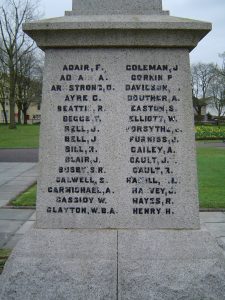
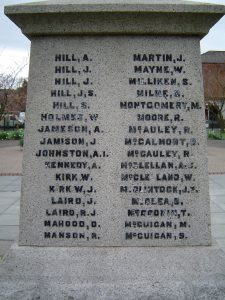
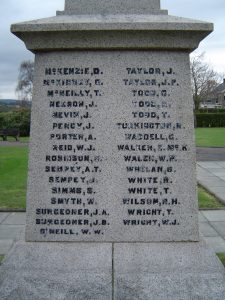
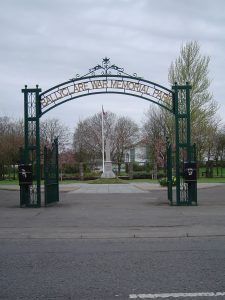
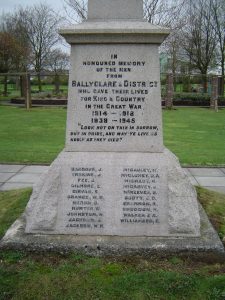
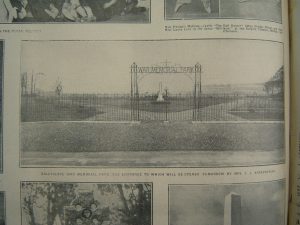
The text on this page has been created mainly from newspaper archive content and it may contain typographical errors. If you can supply additional information, photographs of War Memorials in the nine counties of Ulster, or wish to report errors, broken links, make comments, suggestions, requests, etc. please email
uwms@outlook.com
All contributions will be acknowledged.